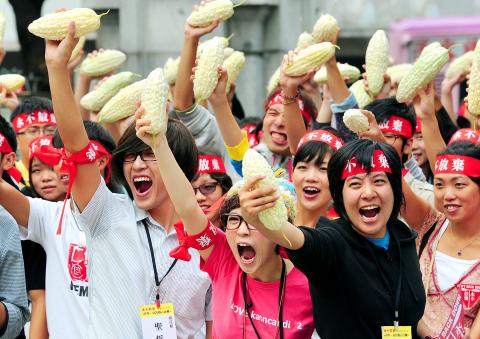Most of the nation’s young people feel pessimistic about the country’s future under the leadership of President Ma Ying-jeou (馬英九), a survey found.
However, a majority of the respondents said they were still confident that they could bring about change.
More than 100 young people joined representatives from the Taiwan Youth Climate Coalition, Across the Ocean 181 coffee shop, popular bulletin board system PTT and the Taiwan Alliance for Advancement of Youth Rights and Welfare (TAAYRW) in a rally held outside the National Taiwan Museum in Taipei yesterday as they released results of a survey.

Photo: Liao Chen-huei, Taipei Times
The survey, with 607 samples collected from people between the ages of 16 and 35, was conducted by the groups between late last month and earlier this month in a bid to find out young people’s perspectives on various aspects of the country’s competitiveness and future.
The responses were rather pessimistic.
When asked which Asian country is the most competitive, 33 percent of the respondents said “China,” while 24 percent answered “Singapore,” 15 percent believed it was South Korea, 6 percent thought Hong Kong and only 5 percent answered “Taiwan.”
Disappointed about current social and economic conditions, 56 percent of the respondents said they would work abroad if given a chance, while 43 percent said they have “never thought about it.”
Asked to grade their quality of life, respondents gave an average score of 61 out of 100 points, while giving an average grade of only 50 out of 100 when asked about the future prospects of the country.
When asked to identify problems with Ma’s leadership, 60 percent said the president was “incapable,” 25 percent said he “has no vision” and that government “policies shift too frequently,” 9 percent said Ma “does not know what the people want” and 5 percent said he “appoints inappropriate people to head government agencies.”
Although pessimistic and disappointed, the respondents were rather confident that they could bring about positive changes to the country.
Seventy-six of those polled said they have taken part in some form of social movement, 77 percent believe that increasing the participation of young people and celebrities in social movements may change the country in a positive way and 55 percent said they believed they could fulfill their dreams and make Taiwan a better place.
“We would like to use this opportunity to call on young people to overturn injustice, to tell society that we will not give up,” TAAYRW researcher Wu Cheng-che (吳政哲) said. “We want to make the government listen to us, and we want to tell them that we are the ones who have the final say on our future.”

Taiwan is to commence mass production of the Tien Kung (天弓, “Sky Bow”) III, IV and V missiles by the second quarter of this year if the legislature approves the government’s NT$1.25 trillion (US$39.78 billion) special defense budget, an official said yesterday. Commenting on condition of anonymity, a defense official with knowledge of the matter said that the advanced systems are expected to provide crucial capabilities against ballistic and cruise missiles for the proposed “T-Dome,” an advanced, multi-layered air defense network. The Tien Kung III is an air defense missile with a maximum interception altitude of 35km. The Tien Kung IV and V

The disruption of 941 flights in and out of Taiwan due to China’s large-scale military exercises was no accident, but rather the result of a “quasi-blockade” used to simulate creating the air and sea routes needed for an amphibious landing, a military expert said. The disruptions occurred on Tuesday and lasted about 10 hours as China conducted live-fire drills in the Taiwan Strait. The Civil Aviation Administration (CAA) said the exercises affected 857 international flights and 84 domestic flights, affecting more than 100,000 travelers. Su Tzu-yun (蘇紫雲), a research fellow at the government-sponsored Institute for National Defense and Security Research, said the air

A strong continental cold air mass is to bring pollutants to Taiwan from tomorrow, the Ministry of Environment said today, as it issued an “orange” air quality alert for most of the country. All of Taiwan except for Hualien and Taitung counties is to be under an “orange” air quality alert tomorrow, indicating air quality that is unhealthy for sensitive groups. In China, areas from Shandong to Shanghai have been enveloped in haze since Saturday, the ministry said in a news release. Yesterday, hourly concentrations of PM2.5 in these areas ranged from 65 to 160 micrograms per cubic meter (mg/m³), and pollutants were

Taiwan’s armed forces have established response protocols for a wide range of sudden contingencies, including the “Wan Chun Plan” to protect the head of state, the Ministry of Defense (MND) said today. After US President Donald Trump on Saturday launched a series of airstrikes in Venezuela and kidnapped Venezuelan President Nicolas Maduro, concerns have been raised as to whether China would launch a similar “decapitation strike” on Taiwan. The armed forces regularly coordinate with relevant agencies and practice drills to ensure preparedness for a wide range of scenarios, Vice Minister of National Defense Hsu Szu-chien (徐斯儉) told reporters before a